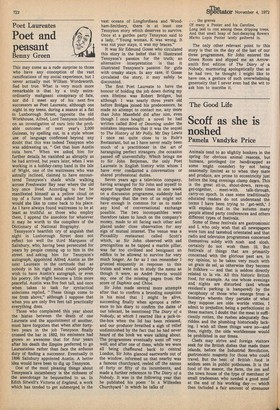The Good Life
Scoff as she is noshed
Pamela Vandyke Price
Animals tend to go slightly bonkers in the spring for obvious animal reasons, but humans, privileged (or handicapped as some might consider) by not being seasonally limited as to when they mate and produce, are prone to eccentricity just before the long evenings clamp dovyn. This is the great sit-in, shout-down, rave-up, get-together, meet-with, talk-through, carry-on epoch. In case some traditionally educated readers do not understand the terms I have been trying to 'get-with,' I will explain that in the autumn many people attend party conferences and others different types of festivals.
Some of these festivals are gastromomic and I, who only wish that all newspapers were turn and tastebud orientated and that radio and television programmes concerned themselves solely with nosh and slosh, certainly do not wish them ill. But festivals of things that are primarily concerned with the glorious past are, in my opinion, to be taken very much with un grain de sel, as otherwise they become le folklore — and that is seldom directly related to la vie. All this historic British food, for example. As one whose evenings and nights are disturbed (and whose resident's parking is hampered) by the cacophony of those who emerge from a hostelrye wherein they partake of what they suppose are olde worlde vittles, admit to prejudice; being a perfectionist in these matters, I doubt that the meat is sufficiently rotten, the rushes adequately flearidden and the plumbing historically lacking. I wish all these things were so—and then, rightly, the olde worldenesse would be prohibited in our times.
Chefs may strive and foreign visitors seek for the British dishes that made these islands, before the Industrial Revolution, gastronomic magnets for those who could travel. But the best of British food is seldom seen in public pothouses. It is the food of the manor, the farm, the inn and the town house of the type of merchant or small tradesman who needed a good meal at the end of his working day — which then included a fair amount of strenuous physical activity. Once you attempt to enlarge on and elaborate the character of what is essentially home cooking, you alter it radically. The result may be agreeable. It is ' not the same thing.' I do not say that there is no point at which chef (or restaurant) cooking and home cooking cannot meet and in fact many of the greatest chefs have been fortunate
enough to marry women whose home cooking was what they enjoyed after a hard
day in the cuisine. But the pleasures of of the dishes — and foods — of the British Isles do not translate to the restaurant scene to advantage.
Besides, food as it is—and has to be — eaten today, can't be any more olde worldelye than clothes. This is why a little
book, Simple Scoff (University of Warwick, 35p), is one of the most creative pieces of cookery writing of the 'seventies. It is the recipes used by some of the
students and staff of the University of Warwick, coping with bedsitter catering, very limited funds, possessing a worldliness and liveliness of the mind that surprised old blasee me. These cooks know what is 'the real thing' as regards certain classic and regional dishes; they also know that in real life one may have to make do with a tin, a packet (albeit a good one), adapt seasonings, adjust consistency (can you cook at short notice or must you plan a day or more in advance?). And they display a very real sharpness of senses and sense as to whether something is filling, impressive, practical — or just quick and cheap.
There are those who seem to suppose I sprang, piquantly sauced, from beneath some (gigantic) salver cover (la Cora Pearl de nos jours), brandishing a magnum of the first growth in one hand and an open invitation from the owners of all the top restaurants in Europe in the other. As the girl who grew up in Coventry in the Depression, in a household where 'plain English food' was admittedly good, but limited (and Sunday's cold, suppers made me, ever since, cook at least two courses every Sunday night, even when by myself), Who once tried to eat the hot napkin at a Chinese restaurant and who was the Wrong side of thirty before I was even aware that there was a difference between claret and Burgundy, I can only admire the young people who have contributed to Simple Scoff. Their interest in food, their awareness of its importance, their lively style of presentation and their total lack of pretentiousness make me hope that, when I am in my bathchair stage, they will condescend to invite me to djne -to see what transformations they have Made in our national and international Ways of eating.
Meanwhile, I can only urge every one of ray readers — even those most anti-me — to buy this little book. You may not be able to like its style, or, indeed, all its recipes (I admit to being too ancien regime to cope with some current trends and, in this context, the baked bean is, alas, a delight reserved for la jeunesse whose metabolism I envy as much as I adore the bean). But this is cooking for our times and I hope the compilers will go on to evolve the cooking of the future. (Good things, we Midlanders can say, come out Of Warwickshire.)









































 Previous page
Previous page